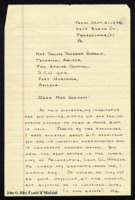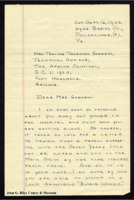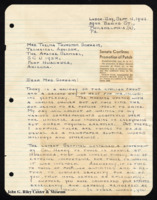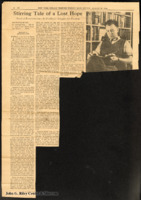-

A letter from Jess Dunson to Thelma T. Gorham, which he notes supplements one written earlier in the day. In the letter, Dunson discuss the recent special edition of The Apache Sentinel, entitled Huachuca Cavalcade. Said earlier letter alluded to a possible slight from one of Gorham's superior officers, this letter suggesting Gorham may have lost her job at The Sentinel. Dunson uses his letter to commiserate with Gorham and notes her exemplary efforts at The Sentinel.
-

In this correspondence from Jess Dunson to Thelma T. Gorham, Dunson sends encouraging words to Gorham as he alludes to a possible slight from one of Gorham's superior officers. He goes on to praise her work in the war efforts and at The Apache Sentinel and encourages Gorham to rest and relax, as she has just returned home from the hospital.
-

Correspondence from Jess Dunson to Thelma T. Gorham in which Dunson makes mention of Mrs. Crystal Bird Fauset, who, despite her being "baptised a democrat," now supports Thomas E. Dewey. He goes on to discuss his day, which consisted of a nap, a warm bath, listening to FDR's Fireside Chat, and a hearty dinner. Dunson closes with a note on the current edition of 'The Afro' referencing a "white slave" movement, noting he wishes the weeklies would mention good things like Gorham's "wonderful set-up" (possibly alluding to The Apache Sentinel).
-

A letter from Jess Dunson to Thelma T. Gorham who, at the time the letter was penned, was recovering from two major operations in the Fort Huachuca Hospital. Dunson begins his letter with a note on his confidence in the competency of the medical professionals at the G.I. hospital. He then goes on to discuss the latest issue of The Apache Sentinel, which contains excerpts from a letter he penned to Sentinel Editorial Assistant Ernestine Hughes.
-

Jess Dunson writes a letter to Thelma T. Gorham during her recovery in the hospital from two operations. Having been notified by Gorham of the suspension of The Apache Sentinel, Dunson discusses taking the time to reread several past copies, which he notes he took great joy from revisiting. Dunson goes on to discuss the previous night's radio shows including one hosted by Cecil B. DeMille, a show from The Lady Esther Screen Guild Players, and FDR's Fireside Chats. He also makes mention of a "Dewey outburst from the Pacific Coast," which presumably alludes to FDR's 1944 presidential opponent, Thomas E. Dewey. Dunson goes on to discuss recent happenings on the Eastern Front, including the conjecture that Adolf Hitler will "take a plane to South America along with his co-partners", and his hopes of D-Day arriving soon.
-

Correspondence from Jess Dunson to Thelma T. Gorham in which Dunson hopes Gorham has made a recovery after several operations. He goes on to mention the "passing," or suspension, of The Apache Sentinel and how he will feel upon its absence, and inquires as to whether Gorham will continue to "endure" Fort Huachuca or return to her native domicile. Dunson then suggests that a publication should write a human interest story about Gorham and her efforts during the war, which he predicts will end in the near future.
-

A letter from Jess Dunson to Thelma T. Gorham in which he inquires about her health after two major operations, noting that she seems to "consider such happenings with reckless abandon." Dunson goes on to express his regret for the "passing" of The Apache Sentinel, which would announce its suspension publicly a week after the letter was penned. He continues with congratulations for her work and contributions to "America's and the negro's war efforts," and expresses the joy he has derived from their correspondence and his hope that it will continue.
-

A letter penned by Jess Dunson to Thelma T. Gorham on Labor Day, 1944. In his letter, Dunson briefly discusses his day, then touches on news that suggests the war will be coming to an end, he also mentions an observation he made of two African-American WACs (Women's Army Corps), which he says are "a rarity" in Philadelphia. Dunson also briefly discusses Gorham's efforts during the war and how he hopes she bears no regrets for her participation. Also included are several newspaper clippings that Dunson suggests are worthy of attention, including one that predicts the release of G.I.s upon the fall of Germany, a war era comic, and a statement on the promotion of Maj. Gen. Alexander M. Patch, Jr. to the rank of lieutenant general.
-

A clipping of the Saturday Sermon, a weekly column by Samuel W. Purvis, D.D. The clipping follows the analogy of life as an island. Also included are two clippings of Gerald W. Johnson's book review column entitled Books and Things. The first column reviews Howard Fast's 'Freedom Road,' while the second reviews Lonnie Coleman's 'Escape the Thunder.'
-

Several newspaper clippings, including one that briefly discusses the life of Gideon Jackson, a character in 'Freedom Road,' a Howard Fast novel that sees Gideon through his life as a former slave during the Reconstruction Era to a position in Congress. Other clippings include a 'Stuff and Nonsensecolumn' by Don Rose that discusses the blacklisting of certain reading materials in US Army camps for fear of inspiring "political ideas" amongst the soldiers, a war era comic, and an article about an incident in which several war correspondents and an artist were forced to leave their posts by the Air Force--an act that spurred protests and investigations.










